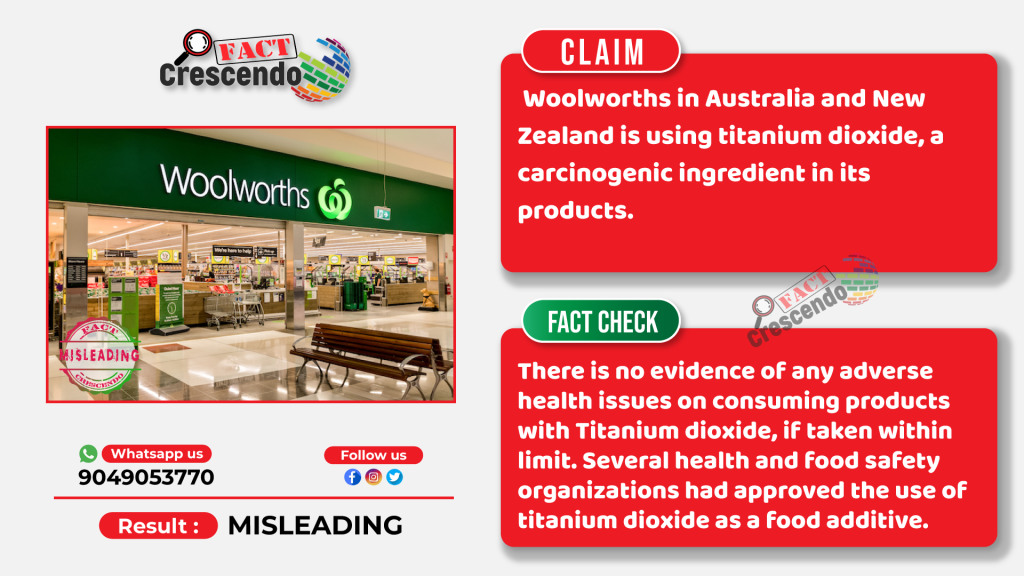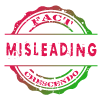
In recent years, people have shown their concerns over the use of food additives in their everyday products. This raised an awareness among the consumers to check the ingredients of the products.
In such a scenario, a social media post showing the use of a chemical called Titanium Dioxide in Woolworths products is going viral on social media. Users are claiming that Woolsworths uses the food additive Titanium Dioxide, a carcinogenic substance for coloring their products.
However, Fact Crescendo found the claim to be misleading. Although it is true that Woolworths uses Titanium Dioxide in its products, the levels of the substance is safe to consume as reported by several health and food safety organizations.
What’s the claim?
A social media user wrote, “Nice to see Woolworths New Zealand making my sour lollies NZ made but why use a potentially dangerous and carcinogenic ingredient for coloring?”
Fact Check-
What Is Titanium Dioxide?
Titanium Dioxide (TiO2) is a naturally occurring inorganic material that is mined from the earth and then processed and refined before it is used. It exists as a white and powdery solid substance. It is used as a white pigment for paints, in the food industry as a coloring agent, in sunscreens and cosmetics. It is also used by pharmaceutical companies for manufacturing gelatin capsules, tablet coatings and syrups.
According to the Titanium dioxide manufacturers Association (TDMA), titanium dioxide is a bright white substance mainly used to add color and texture. It is considered safe as it does not react with other minerals and is used in many everyday products.
Titanium dioxide is used as a color additive in foods known as E171. It is the most effective white colorant because it’s bright, stable in heat and light, and absorbs UV rays. Only a small amount of titanium dioxide is used to get the desired white color.
Is Titanium Dioxide Carcinogenic?
Food Standards Australia New Zealand (FSANZ) reviewed the safety of Titanium Dioxide as a food additive and found that there is no evidence to suggest that the dietary exposure to food with titanium dioxide is a concern for human health. It has been allowed to use titanium dioxide in many consumer products in Australia and New Zealand. It has been in use for many years and has not given rise to adverse effects on humans.
The European Food Safety Authority (EFSA) published a report in 2021 concluding that titanium dioxide could not be considered as safe. However, this report did not have any conclusive evidence that titanium dioxide is harmful, but some studies came up saying that it may damage DNA. In recent reviews that were conducted in the UK and Canada, FSANZ found no safety concerns on using titanium dioxide.
In 2023, Health Canada in a report concluded that there was no conclusive evidence of cancer, DNA damage, or other health issues involving food-grade titanium dioxide. Some studies found harmful effects when titanium dioxide was not eaten as part of a diet, but these effects did not happen when it was consumed with food.
Further, we found that the US Food and Drugs Administration (FDA) has allowed the use of titanium dioxide as a color additive in foods according to the specifications and conditions. According to FDA regulations the quantity of titanium dioxide should not exceed 1% by weight of the food. You can read the details here.
According to the National Library of Medicine, titanium dioxide, also known as E171, has been accepted by food industries as additives mainly for whitening and textures. It is present in some cottage and Mozzarella cheeses, horseradish cream and sauces, lemon curd, and in low-fat products such as skimmed milk and ice-cream. It has also been declared as a ‘natural coloring agent.’ Titanium dioxide (TiO₂) is also used in oral medicines and it is considered safe and non-toxic in small amounts. Although tiny particles of TiO₂ are commonly used in food and medicine, there isn’t much information about how they affect the body or where they go after being swallowed.
On 24 November 2023, World Health Organization (WHO) and the Food and Agriculture Organization (FAO) Joint Expert Committee on Food Additives (JECFA) released an assessment of the health impacts of titanium dioxide. According to the report, TiO₂ is poorly absorbed in the gastrointestinal tract. JECFA found no evidence of carcinogenic, reproductive, or developmental toxicity effects from long-term exposure to TiO₂.
However, some concerns were there for the genotoxicity of TiO₂ nanoparticles. JECFA highlighted the limitations of current testing methods, which may not be suitable for nanoparticles. Despite some uncertainties, JECFA reaffirmed the Acceptable Daily Intake (ADI) for TiO₂ as “not specified,” maintaining its safety for use in food.
Conclusion:
Fact Crescendo found the claim to be misleading. Although it is true that Woolworths uses Titanium Dioxide in its products, the levels of the substance is safe to consume as reported by several health and food safety organizations.

Title:Titanium Dioxide in Woolworths Products Deemed Safe, Not Carcinogenic.
Fact Check By: Siddharth SahuResult: Misleading


